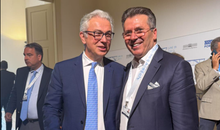
 Flash News
Flash News
Financial Intelligence Agency: This is how corrupt officials launder money

The Financial Intelligence Agency (AIF), in the National Strategy for the Prevention of Money Laundering and Terrorist Financing 2024-2030, provides information on the mechanisms used by politically exposed persons to launder money obtained through criminal acts of corruption or embezzlement of duty.
According to the AIF, these persons, after completing their duties or public functions, make high-value investments in a business, without a clear source of income. Another form of money laundering is the declaration of immediate high profits from businesses owned by former politically exposed persons.
Another phenomenon observed by AIF is the high turnover of funds in individual accounts declared as business income, but which are not justified by business income.
Another typology found by AIF is the initial placement of administrators or legal representatives, but also of partners of legal entities with no record of criminal activity, but obviously without proper preparation in economic or educational culture to own or develop such commercial activities , which are owned de facto by politically exposed persons and which are then transferred in their name. A part of these companies, in sporadic cases, are involved in the field of public procurement.
An important segment of corruption money laundering remains real estate. AIF notes that these individuals make investments in real estate after leaving office without a clear source of income, or make investments in real estate at declared prices that are below market value.
Regarding other entities, AIF estimates that resident individuals continue to be the largest group of entities involved in activities with potential money laundering.
The highest risk scenarios related to individuals are the purchase of assets with an unknown or unjustified source; the benefit of frequent and small value transfers from individuals without a clear connection between them; depositing cash amounts with an unknown source in a bank account; purchase of real estate under value and revaluation within a short time; financial actions (including deposits, transfers, investment in real or movable property) by persons suspected of being involved in criminal activity; high value investment in real estate through the use of third parties.
For non-resident individuals, the main scenarios related to money laundering are the creation and registration of resident legal entities and the use of their bank accounts for receiving or sending transfers from/to different jurisdictions without a clear connection to the object of the activity. society, with suspicions mainly related to fiscal evasion; making investments, mainly in real estate, without a clear source of income.
Resident legal entities, according to AIF, continue to represent the second largest number of subjects involved in possible money laundering activity, mainly with the source of income from crimes in the tax field, fraud, organized crime, corruption. Key scenarios include:
placement of funds of unknown origin in real commercial circulation;
- investment in real estate in the name of the existing company owned by persons suspected of being involved in criminal activity at unjustified values with legal sources;
- the benefit of large transfers to the business account of the person suspected of being involved in criminal activity from society without a clear connection between the service or goods offered and the payment;
- the involvement of a single individual in several entities that have the same object of activity or the same address and the carrying out of transactions without a clear connection between the parties to the transaction;
- suspicious transfers received on account of a company, which has no real economic activity;
- the use of legal entities for the benefit of transfers from abroad through fraud where the vast majority of funds are channeled abroad and a part is withdrawn in cash./ Monitor
Latest news


Not only the body, swimming also helps the brain
2025-07-05 21:02:49
"Be careful with the water", Alimehmeti warns about the health risks of summer
2025-07-05 20:39:10
PSG beats Bayern Munich 2-0, advances to Club World Cup semifinals
2025-07-05 20:19:38

Two vehicles collide on the Elbasan-Peqin axis, drivers injured
2025-07-05 19:26:29

What does Zelenskyy have more than Zegjineja?
2025-07-05 18:45:26

Fiscal peace, but at a cost
2025-07-05 18:00:10
'Bankers' tax evasion, Chinese CEO and former director jailed
2025-07-05 17:39:21
Kyle Walker joins English club on two-year deal
2025-07-05 17:20:24
Two cars collide on the Saranda-Delvina axis, 4 injured
2025-07-05 17:05:29
Touching gesture! Liverpool will pay Jota's family's salary until 2027
2025-07-05 16:45:18
The zodiac signs that cheat most often
2025-07-05 16:25:53

"I asked for the dismissals", Dredha tries to soften Rama's 'blow' in Vlora
2025-07-05 15:48:49
Bomb threat in Parliament, prosecutor: It was a lie
2025-07-05 15:22:28

Bardhi: The recount revealed how greedy Zeqine Balluku is in stealing
2025-07-05 14:44:29
Knife wound on the secondary road Tirana-Durrës, perpetrator sought
2025-07-05 14:37:54
Tears and pain, Diogo Jota is escorted to his final home
2025-07-05 14:21:34
Success starts with yourself! Simple ways to invest in personal development
2025-07-05 13:58:50
Unlicensed firearms found in apartment, 50-year-old arrested in Lushnje
2025-07-05 13:43:11

Tirana Court remands Skerdi Sina to prison
2025-07-05 12:59:34
Cocaine laboratory in Greece, here are the Albanians arrested and wanted
2025-07-05 12:40:16
Directed Justice/Vangjeli: SPAK does not investigate any scandal involving Rama
2025-07-05 12:22:03

Bomb alert, Police remove MPs and media from Kosovo Parliament building
2025-07-05 11:48:16
"The will of the people" and the irony of ordered resignations
2025-07-05 11:32:05
Summer drowning risk: How to enjoy the water without risking your life
2025-07-05 11:20:27
Fire situation in the country, 16 fires reported in 24 hours, 4 still active
2025-07-05 11:07:04
Car hits pedestrian at white lines, injured in serious condition in Vlora
2025-07-05 10:59:58
Mosquito-borne diseases are a growing problem in Europe
2025-07-05 10:44:13



One of Sweden's most dangerous and wanted criminals arrested in Turkey
2025-07-05 09:38:29
Foreign exchange/ How much foreign currencies are bought and sold today
2025-07-05 09:18:38

"Don't be influenced by the opinions of others", today's horoscope
2025-07-05 08:40:50

Morning Post/ In 2 lines: What mattered yesterday in Albania
2025-07-05 08:02:07

Trump says he's ready to raise tariffs to 70% on some countries
2025-07-04 22:35:52
Tre shenjat e zodiakut që do ‘pasurohen’ në Korrik
2025-07-04 22:05:09
Gaza War: Hamas Accepts US Proposal for 60-Day Ceasefire
2025-07-04 21:50:10
Autocracy in Albania, Fuga: Governance has gotten out of control
2025-07-04 21:40:51
Meta: Agriculture on credit, the new fraud!
2025-07-04 21:26:39




Vote recount in Durrës ends without changes
2025-07-04 20:12:54
Gas station explodes in Rome, 25 injured (VIDEO)
2025-07-04 20:00:20

These afternoon habits often sabotage weight loss
2025-07-04 19:39:28
Former Arsenal player Thomas Partey accused of rape
2025-07-04 19:24:21
Shepherd disappears without a trace in Delvina
2025-07-04 19:14:31

Bardho gave Zegjine's mandate/Braho: Unfair! It violates the electoral system
2025-07-04 19:01:08


Rapid developments in the Sultanates!
2025-07-04 18:00:06



Italy tightens rules for skateboard traffic
2025-07-04 17:20:18

Unusual for the time, dense fog covers the coast of Vlora
2025-07-04 16:48:01


Accident on the Shkodra-Lezhë axis, one dead and 3 injured
2025-07-04 16:14:19
Albania with fewer requests for asylum and Albanian citizenship in 2024
2025-07-04 16:06:57

Albania last for quality of life, DP: Technical government is the solution!
2025-07-04 15:42:30
Nico Williams says "No" to Barcelona, signs with Athletic Club until 2035
2025-07-04 15:33:35
Fires in the country, four fires are still active, what is the situation?
2025-07-04 15:24:20

Summer brings big changes for these 4 zodiac signs
2025-07-04 15:00:04
Osmani: MPs need to agree to a secret ballot for the Speaker of Parliament
2025-07-04 14:51:09
Serious accident on the Peqin-Elbasan axis, two injured
2025-07-04 14:37:56

GJKKO leaves in force the security measure for the head of the KPP
2025-07-04 13:58:17
Who will replace Ilir Meta and take over the leadership of the PL?
2025-07-04 13:50:36
Berisha: Dismissal of directors in Vlora, another act of 'scapegoats'
2025-07-04 13:41:46




Librazhd/ In a serious psychological state, the young man consumes pesticides
2025-07-04 13:05:07


Weapons trafficked from Kosovo to Albania, two arrested, 8 pistols seized
2025-07-04 12:33:28
Konsumimi i tepërt i çokollatës, ja cilat janë dëmet që shkakton në organizëm
2025-07-04 12:23:35

Fires in the country, 21 fires in the last 24 hours, 4 still active
2025-07-04 12:00:19
WB calls for debt transparency: Albania to publish details of every loan
2025-07-04 11:50:05
